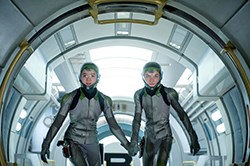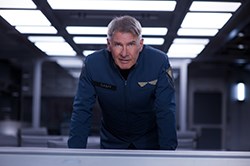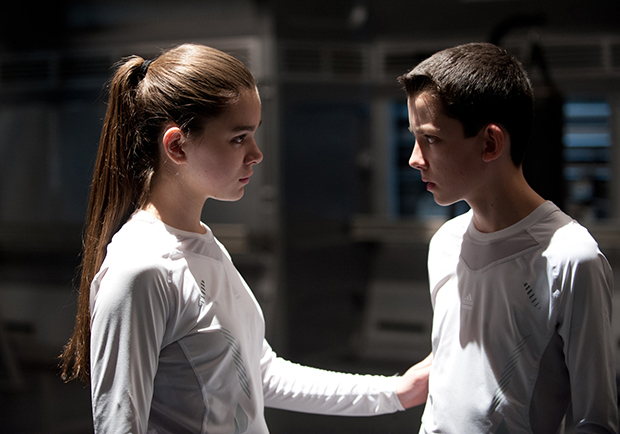I was about the same age as Ender Wiggin (six years old) when I read his story of being drafted to Battle School. The pivot of that School—Orson Scott Card's Cold War brain child, the Battle Room—mushroomed in my imagination: a zero G contest, hand to hand combat between child armies. The contests were humiliating, disorienting, brutal.
The Battle School itself was the Room manifest, a place where gravity has no direction or meaning, where there is no up or down, where isolation and fear are made complete. Remember, reminds Alai, Ender's one (maybe only) friend, "the enemy gate is down." The only anchor is the enemy.
"He must believe he is alone," says Graff, the Battle School Commander (Harrison Ford in the new film). "That no one will ever come to help him." It's a child's nightmare, a child's dream; the trial of adolescence at its most naked and violent.
Ender Wiggin (played in the movie by Hugo's Asa Butterfield) was the character Card's Battle Room needed to come online. It has been decades since "the Buggers"—what the movie politically corrects as "Formics"—attacked, defeated, and devastated the finest fleets Earth sent to repel them. A program of eugenics is designed to marshal Earth's best and brightest, and Ender's parents are a genetic match. Their union is in service of the Fleet, of the cause. Their oldest, Peter, was rejected for his violence; the middle Valentine, for her compassion. Ender, the Third (a slur in an age of population control) is created for his astonishing genetics.
Ender's Game is an unfilmable book, Card once said, because everything happens in Ender's head. He is to be the greatest genius, the strongest, the most powerful human ever born. He is to be a god.

To make him that way, the Battle School is formed to break him. He is isolated. He is tested, abused, and pushed. He is alone. And that's what made the character that prompted soliders and adolescents and lonely children to write to Card.
But this adaptation by director Gavin Hood (X-Men Origins: Wolverine, Tsotsi) softens the edges—unhelpfully so, I think. Boys who are killed in the books are only wounded in the movie, and games the Battle School plays on Ender to break him, psychologically and physically, are shorter, more obvious, less violent.
And most obviously, the children in the movie are older than Card's original vision of a six-year-old Ender. These were not just child soldiers, but people who would never remember any other life. The book was about a rupture of innocence, and that's softened too much by the movie, though that adaptation was likely necessary for the rating. Even the mystifying shift from Buggers to Formics, the former earth slang for the alien's insectoid carapace, seems designed to soften the obvious Orientalism. The movie feels morally listless and dishonest, having scalped the more brazen, the more expected, violences.
And for such a timeless character, a boy who captures and defeats the disorientation of childhood and adolescence, the movie script feels oddly out of time. When I first read Ender's Game in1989, even the multipolar world of the 1990s was a far-off dream. It was a world with words like "hegemon" and "Warsaw Pact": eugenics and the technological society were dangerous, unstable innovations.
In trying to update and modernize the context, the movie runs ashore of the same problems that other reboots in the science fiction and super hero franchise have. It's just not the same world out there: the moral universe, even the fictional one, has simply changed too radically. Today, it's not that we're not locked into bipolar détentes between superpowers. Instead, we're alarmed as the moral foundations these reboots take for granted and try to defend crumble around us. Our apocalypse does not come from beyond, but grows from within. Heroes like Green Lantern seem quaint, silly, a bit ridiculous—perpetual suspicion long ago undressed them and sent them packing. Ender's Game's eugenics, its bipolarity, its ends vs. means moralizing—all of that is now old hat. It's not irrelevant, just dated in its form and style.
But not Ender. Nor the heartbeat of the story that pounds across the book's pages and the movie's minutes.
And the movie really does "pound" it. The book is more subtle, more suggestive, scrawled across the screen's opening moments.
In the moment when I truly understand my enemy, understand him well enough to defeat him, then in that very moment I also love him. I think it's impossible to really understand somebody, what they want, what they believe, and not love them the way they love themselves. And then, in that very moment when I love them . . . I destroy them.

In his tactical genocide, Ender Wiggin still parrots the deep, resonant wisdom of Pope Benedict XVI: knowledge is never purely a work of the intellect. That sort of wisdom makes the book recommended reading at military academies and marine schools—to know someone you must love them. As moral philosopher Alasdair MacIntyre says, the first virtue of knowledge is empathy. There can be no conversation, not even constructive disagreement, apart from empathy. The refining fire of the Battle School is stoked to enflame both Ender's violence and his empathy. It is meant to brand his brother Peter and his sister Valentine onto his psyche, to mold them together into a militant whole.
Love, it turns out, is the secret to the war. It is the window into weakness and into knowledge. But Ender must not only love—he must fear, and in the moment his love shows him the enemy as himself, he must not embrace, but destroy.
No one who knows heartbreak and loss needs to be told that love is power, and that when this power is twisted, it can destroy us, level our homes, and bleed our wounds like no other power in this world. Twisted love is a deep evil. It is a weapon of mass destruction.
The enemy's gate is down, remind the child soldiers of the Battle School. In a weightless world without a moral north, with zero gravity and destructive empathy, it is direction we most pointedly need. Ender's Game is more than game, its Battle Room more than play, its manipulations and its means directive of its ends. Ender Wiggin uncovers a deeper secret at the last, one which haunts his person and wrenches the movie, the story, and his person.
None of those words mean what you think they do: the enemy's gate is down. It is. Except when it isn't.
Caveat Spectator
Ender's Game may ask big questions, but it does it with children as moral pawns and violence as its constant companion. There is nothing especially gruesome or bloody, nor is there much in the way of profanity, but plenty of violence, both psychologically and physically, does take place in hand-to-hand and ship-to-ship combat.
Robert Joustra teaches international politics at Redeemer University College. He is an editorial fellow with The Review of Faith and International Affairs, a fellow with the D.C. think tank The Center for Public Justice, and tweets about life, the universe, and everything @rjoustra.









